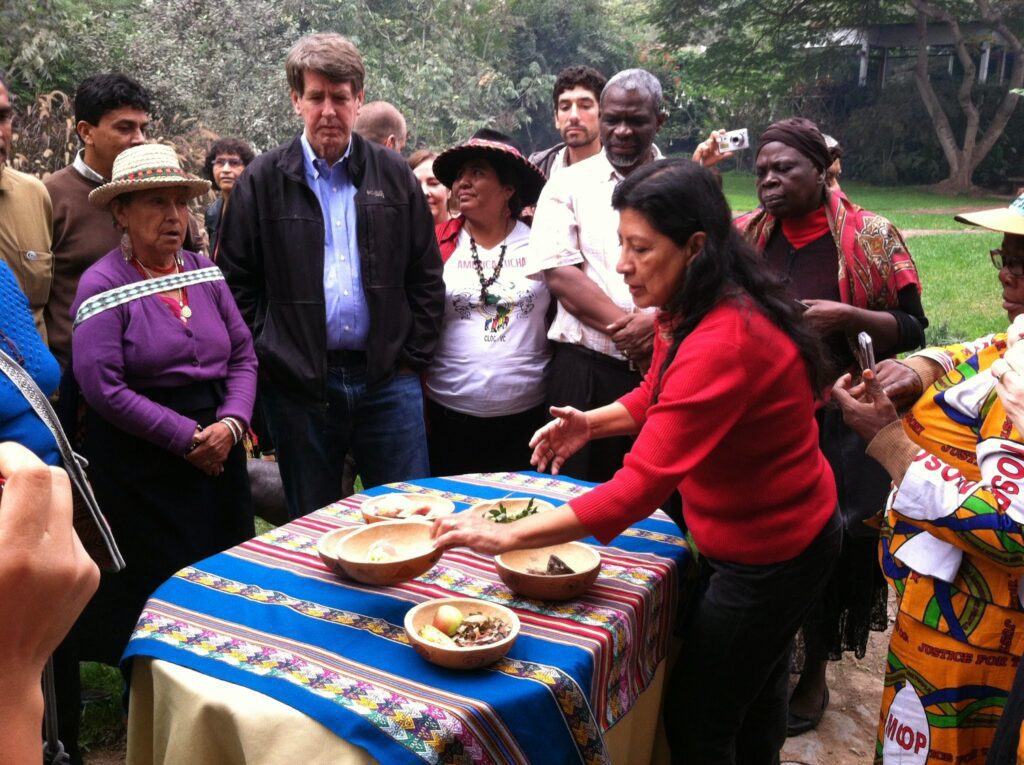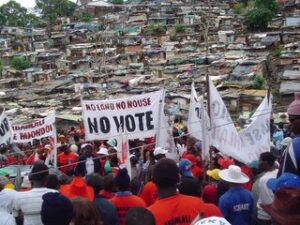
The dominant narrative of our time centers on the triumphs and power of global capital, the failings of weakened democracies, the growth of inequality and misery, and the repeated outbreaks of horrific political and religious sectarian violence. It is a narrative, fed to us daily by the media and our official political leaders, that almost seems designed to produce passivity if not paralysis. This is why we’ve committed ourselves to experience and create another narrative. It’s a narrative that is less often reported, but is always more powerful and enduring– the story of social movements around the globe fighting to create a radically different and liberating reality.
At the end of May, three of us (Larry Cox, Dawn Plummer, and Alicia Swords) from the Kairos Center/Poverty Initiative traveled to Pachacamac, Peru to participate in a meeting of the International Network for Economic, Social and Cultural Rights (ESCR-Net) Social Movements Working Group. The meeting was hosted by the Peasant Confederation of Peru (CCP) with strong support from the Coordinator of Andean Indigenous Organizations (CAOI). We joined 22 other movement leaders and human rights fighters from 16 countries (see the list below). For five days we shared experiences, strategies, and cultural expressions. We discussed common challenges such as leadership development, managing alliances, efforts to privatize the commons (land, sea, energy, seeds), and increasing the participation and leadership of women. In relation to all of this, we explored ways to strengthen international solidarity.
[aesop_image img=”https://kairoscenter.org/wp-content/uploads/2014/07/IMG_4753.jpg” align=”center” lightbox=”on” captionposition=”left”]
The diversity of the groups reflected the diversity of the countries and cultures from which we came, the different focuses of our struggles, and our different strategies and methodologies. What we deeply shared is the commitment to building movements whose power is not dependent on external funding or insider connections but comes from the mass mobilization and demands of people fighting for their dignity and human rights.
The experiences of the leaders we met does not allow for romantic notions or illusions about the vicious forces determined to keep exploitation and oppression in place. Yet the stories of repression told at the meeting were more than matched by the rituals and songs celebrating a common and indomitable faith and spirit. They were more than matched by the sharing of victories already won against all odds: victories not only in stopping immediate threats such as eviction but also in going on the offensive and forcing changes that reflect and increase peoples’ power.
[aesop_image img=”https://kairoscenter.org/wp-content/uploads/2014/07/IMG_4674.jpg” align=”center” lightbox=”on” captionposition=”left”]
Once again, we learned the importance of sharing our perspective from the United States. We shined a light on the poverty, inequality and injustice that flies in the face of the globally shared myth of the “American Dream.” We brought with us images and stories of resistance and building a new path, eliciting hope and the desire for deeper connections between people on the front lines of struggle in the US and those around the world.
The experience and knowledge we gained and the connections we made at this meeting are critical to our work at the Kairos Center and Poverty Initiative, and we’ll continue to build on these with exchanges to come. We are striving, through dialogue and study and action, to better understand and communicate the role religions can and must play in the fight for social justice and human rights. The movements that were present in Pachacamac and other movements around the world combat the use of religion to divide and oppress and demonstrate that religion at its best, including in unorthodox forms not officially sanctioned, can be a powerful force for liberation.
[aesop_image img=”https://kairoscenter.org/wp-content/uploads/2014/07/IMG_4738.jpg” align=”center” lightbox=”on” captionposition=”left”]
Drawing on this power and the power of human rights, the Kairos Center and the Poverty Initiative are working with others to reignite a campaign led by the poor to abolish poverty and the systems and forces that produce it. These systems and forces are global and so must be any effort to challenge them. We want and need to learn from and develop strong ties with movements in other countries so that the fight to create a different society is also and always a fight to create a radically different world.
The links below are to photos, videos, interviews, and stories that illustrate just a few examples of the remarkable movements fighting for that world. All offer important lessons to be learned, present a basis for hope, and highlight the urgent need for solidarity and action as we move forward together. We hope to feature more of these stories from the leaders we met at the convening in the future, so look out for our updates via email, here, and via Facebook.
Learn about the Movement of People Affected by Dams from Brazil
Learn about Defend Job Phillippines
Learn about Ekta Parishad from India, including an audio interview with a leader in the movement
Learn about the Shack Dwellers’ Movement from South Africa
Learn about the People’s Movement Against POSCO from India